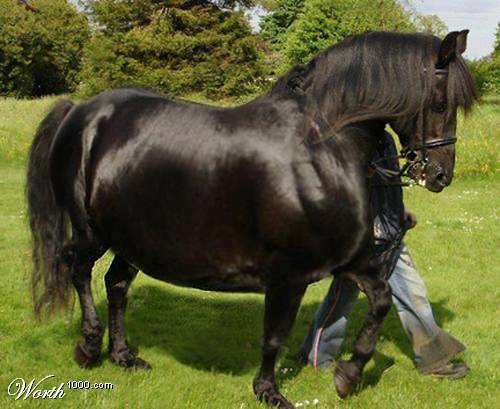

Must be cultural, ethnic, infectious, too much TV and computing, too little sleep, etc.
At (sic) isn't just people that have gotten fatter as society has converged on the Utopian ideal of enough food for everyone at low cost. Over 20 percent of horses are overweight or obese too.Must be.
A pilot study carried out by The University of Nottingham's School of Veterinary Medicine and Science and published in Veterinary Record showed that rates of obesity among horses are likely to be just as high as they are among people, a condition that can lead to laminitis and equine metabolic syndrome.
Yes, horses can have metabolic syndrome also.
The study was conducted by third year veterinary student Helen Stephenson and assessed the prevalence of obesity among horses whose owners were registered with Oakham Veterinary Hospital, one of the school's clinical associates specializing in the treatment of horses. The results showed that English horses, as was already found in Scottish horses, are getting really fat.
Five hundred owners were sent questionnaires, none of them kept horses for breeding, livery, riding stables, or competition, so were all classed as keeping their animals for leisure only.
Of the 160 returned one in five showed that their horses were either overweight or obese. The owners were asked about their perceptions of their horses' body condition, and asked to score this from zero to five, with a score of more than 3 indicating overweight.
Grass was the main source of forage for half the horses and coarse mix was the main source of concentrate feed in a similar proportion. Only one in 10 horses was not fed any concentrate.
The researchers then assessed the body condition of 15 randomly selected horses to see if the scores had under or overestimated the horse's weight. They assigned an average score that was significantly higher for these horses; eight of the owners had scored their horse at least one grade lower than the researcher had, indicating that the owners had underestimated their horses' weight.
On the basis of the researchers' findings, the authors estimate that the true prevalence of overweight/obesity was likely to be 54% rather than the 20% indicated by the questionnaire responses. So incidence of obesity is a multi-species problem, affecting both humans and their companion animals.
If you want to save the planet, stop making the animals sick.









No comments:
Post a Comment